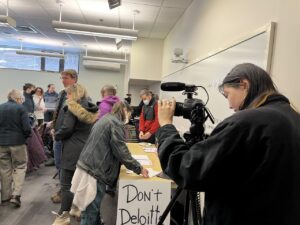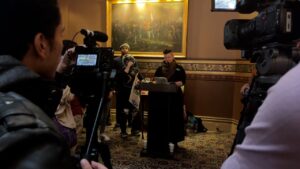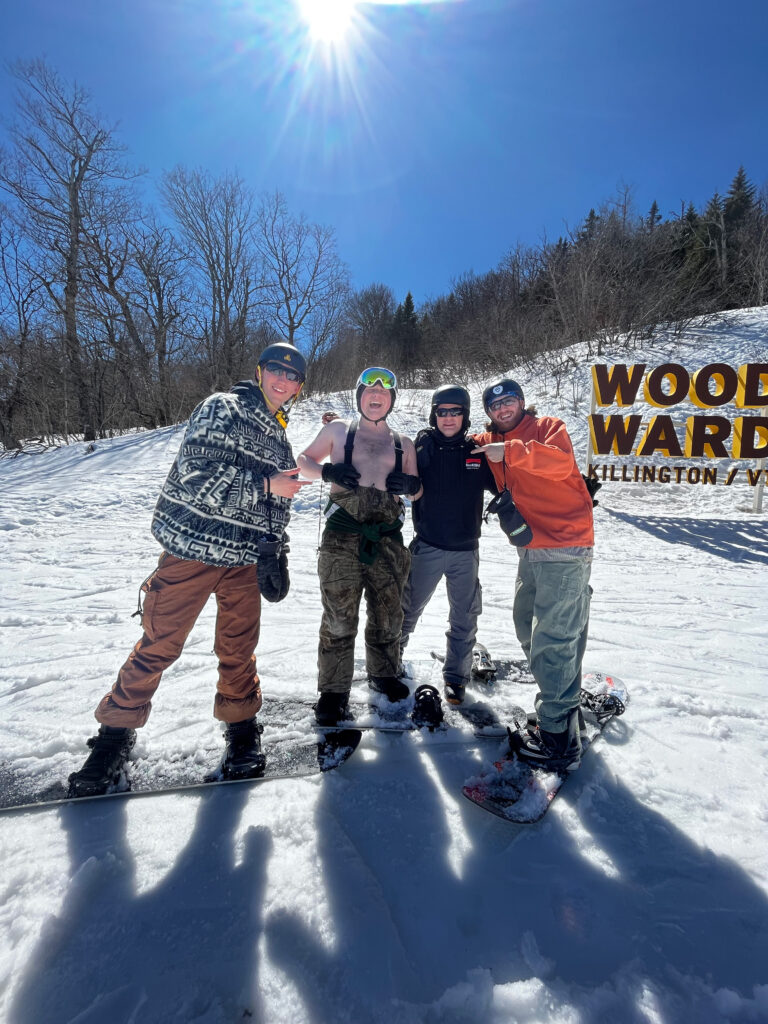Filming the fallout

Since the announcement of the digitization of Vermont State University libraries in February, Castleton students, faculty and alumni have done all in their power to protest the decision.
From student and faculty forums to petitions and in-person stand ins, it’s been the topic of conversation for months. Such a source of campus-wide discomfort simply couldn’t dismissed in the classroom. In fact, it’s even become interwoven in class projects, providing students an opportunity to apply their developing skills to a tangible issue.
Nine students in the media and communication department’s Documentary Filmmaking class have been documenting the decision since day one, culminating with the decision being rescinded on April 24.
“The surface level of the story is about the library, but we see these people banding together through the entire course of it fighting a system that’s not necessarily having the best people’s interest in mind,” said Will Smith, co-producer of the project.
Sam David-Boyd, professor of the class, had originally planned two more projects for the semester, but offered students the choice to pursue the library decision instead.
“I’m really grateful Sam gave us the opportunity to do this as a class project,” said Lily Doton, fellow co-producer. “It’s been really cool to work on a longer piece because most of the films thus far have been short films.”
Smith and Doton explained the significance of a documentary format in conveying the storyline.
“[The documentary] is showing the students and faculty that their voices matter, their voices do stuff. The impact is that we’re trying to effect change and growth, and that’s the reason we come to school in the first place, is to grow,” Smith said.
“I think that documentaries are a really powerful way of telling stories because actually seeing the testimonials people gave and seeing faculty and staff gathering, it adds to the overall message. It’s nice to have a physical representation of what’s been going on,” added Doton.
Students in the class commented on their hard work and progress made thus far.
“So far I think it’s looking really good and it has so much potential,” said Maddie Lindgren, who has contributed “a little bit of everything” including filming, editing and interviews. “Everyone has put in a lot of time and work and I’m so impressed with what’s going on around me.”
“With us alone creating all that content already is just crazy,” added Jacob Gonzalez, who has primarily worked on filming and editing content. “The strides we’ve taken to try to complete this in one semester is crazy as well. We’re very passionate about this whole thing and I think that’s a testament to the amount of work we’ve done.”
Davis-Boyd wholeheartedly agreed with their self-assessment, saying that she’s “constantly being blown away by the class and their work and dedication.”
They are currently done with the filming process and have established a vision for how it will come together. All that’s left now is a lot of editing.
Students said that it’s a lofty goal to have the documentary done by the end of the semester, but they are willing to give the project however long it needs.
“We’ve spent almost three months gathering footage, so I also don’t want it to feel slapped together,” said Smith. “So if that means that I have to work on it after the semester, I will.”
In addition to the documentary’s significance as a work of media, the project has allowed students to work on a variety of skills, especially collaboration.
“It’s really good opportunity for everyone to work on something together,” said Jacob Ruben, one of the lead editors.
Similarly, Gonzalez has “improved a lot upon taking constructive criticism and working with a group to form one solid project.”
Lindgren commented on her new and improved editing skills.
“I came into this year with zero editing experience, but I think this has been a really good experience to continue editing. I learned to really love it and I didn’t even know I was good at it until I started doing it,” she said.
For Smith, the project has helped him “ask better question to get better responses” and feel more comfortable reaching out to people he doesn’t know.
Everyone in the class is excited for the final product, whether in be in the next coming weeks or next semester.
“Not a lot of students in their undergrad can say they’re working on a documentary as it’s happening,” Gonzalez said. “I’m truly blessed to have this opportunity, along with the other fellow students that are working on this with me, to be able to work on something that’s bigger than ourselves.”








